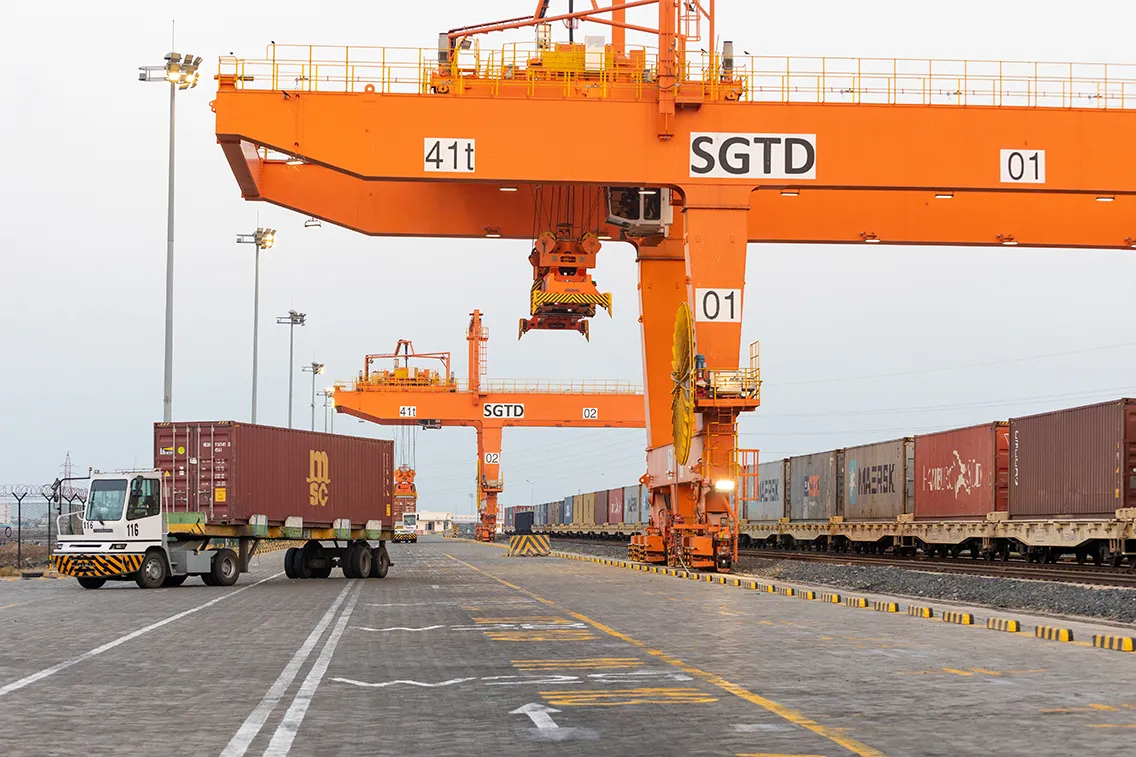In Djibouti City, it is impossible to ignore the omnipresence of port infrastructure. In the heart of the capital, near the historic port, a brand-new floating dock immediately catches the eye. This industrial colossus, designed to accommodate ships with a deadweight tonnage of up to 50,000 tonnes, is parked in the bay before its transfer to Damerjog, where a new strategic port is taking shape south of the capital.
A few kilometres away, towards the Gulf of Aden, the gantries of the Doraleh Container Terminal Management Company (DCTMC) dominate the skyline. A pillar of the Djiboutian maritime sector, the terminal has become an important contributor to the country’s GDP. Recently reinforced by four new gantry cranes, the facility can handle up to 1.8m TEU (twenty-foot equivalent units) per year.
Just behind it, on the coast, the Doraleh Multipurpose Port (DMP), specialising in solid, mineral and agricultural bulk cargo, takes over. A significant aspect of Doraleh Multipurpose Port is its capacity to accommodate large vessels, thanks to its deep-water berths and modern handling equipment. The port features several specialised terminals, ensuring efficient management of different cargo types. It is equipped with advanced cranes, automated systems, and storage facilities designed to streamline operations and reduce turnaround times. These technological advancements make DMP an attractive destination for global shipping lines and businesses seeking reliable maritime logistics solutions. In 2024, DMP handled 3.4m tonnes of goods, a volume up 12% year on year.
This Djiboutian port network, centred around seven specialised facilities, is a rare model on the continent. In addition to the behemoths SGTD and DMP, terminals such as Tadjourah (specialising in ores) and Ghoubet (salt export) complete the logistics offering. The whole is designed to capture international trade flows transiting through the strategic Bab el-Mandeb Strait, an area through which some 15% of global maritime traffic passes.
Free zones: a strategic complement
To maximise its appeal, Djibouti is not content with its port infrastructure: it is integrating it into a network of free zones, real growth relays to capture more trade flows. The future Djibouti Damerjog Industrial Free Zone (DDIFZ), 30 km south-east of the capital, represents a colossal investment of more than a billion dollars. By 2035, this industrial port site will be home to oil depots, a refinery, a cement factory and a power station, backed by an oil port.
This mega-project is in addition to the Djibouti Free Trade Zone (DIFTZ), a vast 4,800 hectare site inaugurated in 2018. Specialising in light industry, it is now home to international companies, mainly in logistics. “The challenge for Djibouti today is not only to transit goods, but to capture more added value locally,” says Abdi Adawe Sigad, CEO of SGTD.
This move up the value chain is already evident with industrial players such as Golden Africa, a subsidiary of the Yemeni giant HSA Group, which has invested in a palm oil refinery in Djibouti. Its site, directly connected to the port of Doraleh, does not just import and redistribute, but also processes and packages the oil before exporting it to landlocked Ethiopia and other markets in the Horn of Africa.
At the same time, Djibouti is strengthening the integration of its port, airport, road and rail logistics to improve the flow of trade. Chinese cargo (phones, jewellery and watches) transits through SGTD and DMP, then is sorted in the free zone before being shipped via Ethiopian Airlines and Kenya Airways to 53 cities and 36 countries. The aim is to establish its role as a key logistics hub in the region.
A sector facing its limits
However, Djibouti remains heavily dependent on its port infrastructure and associated services, which is said to generate upwards of 50% of the country’s GDP. This is a risky concentration, as it exposes the country to external disruptions, particularly tensions in the Red Sea.
Despite its importance from a GDP perspective, the port sector does not, proportionally speaking, offer a large number of jobs. Unemployment, particularly among young people, remains high, making economic diversification essential, according to observers. “I think that the development of light industrialisation is a concrete response to this challenge,” says Youssouf Moussa Dawaleh, president of the Chamber of Commerce. But if Djibouti wants to take full advantage of this move upmarket, it will have to resolve another major challenge: the high cost of energy, which hinders the establishment of high value-added industries.
Crédito: Link de origem


